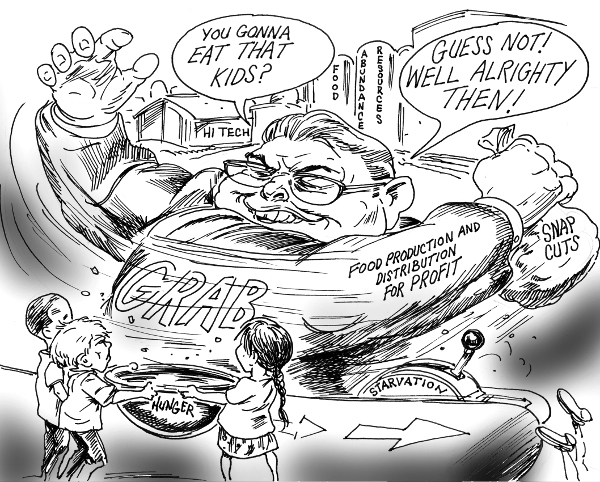
Our world is abundant. Nature provides. Technology provides. Yet more and more Americans are going hungry. Why?
The question of hunger, food production and food usage is entering the public debate. This is coupled with attacks on basic safety net pieces like Food Stamps, welfare, and school lunches. What little remains of these programs leaves many wondering how they are going to attain basic things like food and water.
From the community gardens and organic farms of California to the land trusts and land reclamations of cities like Flint, Detroit, and Chicago, many activists propose that the solution is taking land and growing food. But the larger question remains: who is to have control over food production, land use and distribution of goods and resources? Who is to determine if we eat and how?
The specter of hunger looms large over the future of this country as 50 million Americans go hungry. Low-wage workers, veterans, students and everyday people scrape to put food on their plates.
This virtual starvation is taking place en masse, and is a clear attack on the working class as a whole. Food stamps are cut at exactly the time when more and more people will need them. Meanwhile, politicians, and leaders in both of the major two parties position themselves as though they speak for the people, or side openly with the corporations, blaming the workers for their poverty. How are we to respond to this daily threat?
Currently, the question of eating rests in the hands of an economic system that is destroyed daily by an objective process. That objective process is the automation of human labor. Everything from farm work, customer service, bank tellers to manufacturing is done by robots. In this economic environment, there are fewer and fewer jobs. People without jobs cannot afford to buy the goods and services that robots are producing.
In essence, more and more people are starving with no options or foreseeable solutions. Meanwhile, corporations and the automated food industry continue to produce tons of food with no regard for anything but its soaring profits and more and more dramatic measures at tax evasion.
We must take over the corporations and nationalize the food supply. We can never build enough community gardens, or establish enough land trusts to address issues of hunger in the nation. Automation, and much of the corporate owned land can and should be owned and used by the people in the interest of the people.
The distribution of resources in the country cannot remain in the hands of a small class of billionaires and corporations who have no problem exploiting and killing people and destroying the planet if it meets their bottom line. The people have to organize in their most basic interests of housing, health care, and even food and water.
With the automation of production, capitalism can no longer meet the needs of a shrinking workforce. Yet there is more than enough for everybody. The technology today can produce enough food to feed the world. No one needs to go hungry! Nationalizing the food industry is an important step toward creating a new society where all necessities are distributed by need.
FOOD: Corporations profit, millions starve
Latest
Free to republish but please credit the People's Tribune. Visit us at www.peoplestribune.org, email peoplestribune@gmail.com
The People’s Tribune brings you articles written by individuals or organizations, along with our own reporting. Bylined articles reflect the views of the authors. Unsigned articles reflect the views of the editorial board. Please credit the source when sharing: ©2024 peoplestribune.org. Please donate to help us keep bringing you voices of the movement. Click here. We’re all volunteer, no paid staff.

